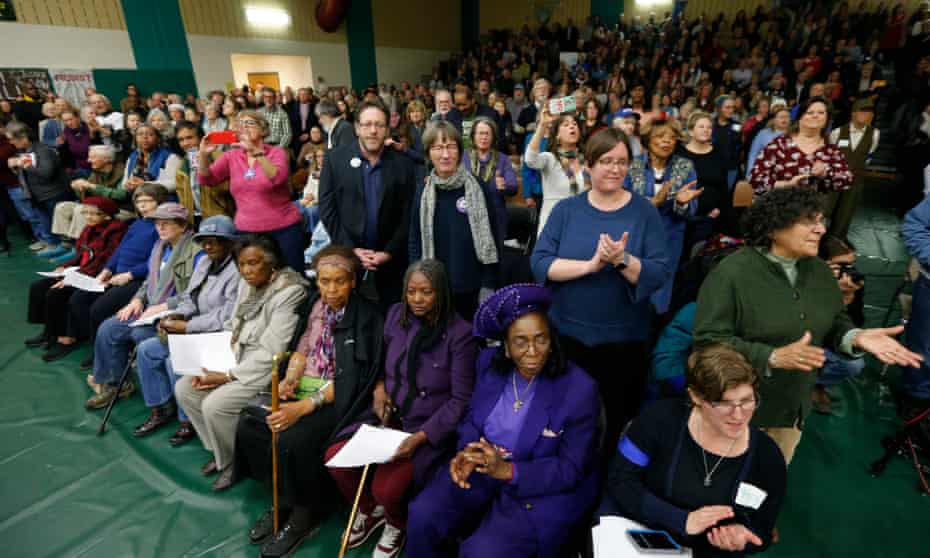A historically Black town stood in the way of a pipeline – so developers claimed it was mostly white

When residents in Union Hill, Virginia, decried the pipeline as a form of environmental racism, the energy company insisted it wasn’t
Last modified on Thu 16 Sep 2021 13.47 EDT
As fracked gas fields in West Virginia boomed over the past decade, energy companies jumped at the chance to build massive new pipelines to move the fuel to neighboring east coast markets. The 600-mile Atlantic Coast pipeline would have been the crown jewel.
But Union Hill, Virginia – a community settled by formerly enslaved people after the civil war on farm land they had once tilled – stood in the way. Residents fought against a planned compressor station meant to help the gas move through the pipeline, arguing that because Union Hill is a historic Black community, the resulting air pollution would be an environmental injustice.
But Dominion Energy, one of the pipeline’s two developers, kept pushing. It pledged to invest $5.1m in community services in exchange for the imposition. The company hired a former member of the governor’s cabinet, who grew up in Union Hill, to drum up support from church leaders to landowners. They flew local leaders on a helicopter to Pennsylvania to tour a compressor station there.
Dominion’s campaign split the Union Hill community, dividing church congregations, and in some instances, families. While some residents were for the investment, others saw their resolve to fight the pipeline deepen. In response to mounting opposition, Dominion took an unexpected tack: the company hired outside help to argue that the community around the site was, in actuality, mostly white.
“No environmental justice community is disproportionately impacted,” the pipeline project told state officials January 2019, arguing that the communities around the project were “not majority minority or low income”. Dominion did not respond to multiple requests for comment for this story.
The locals who took on Dominion eventually became the linchpin of a campaign that helped to get the pipeline canceled. But the fight against the Atlantic Coast pipeline is a familiar story now playing out around the country as gas companies expand a sprawling web of pipelines. Even when minority communities say no, the fossil fuel industry keeps saying yes.
In Minnesota, Indigenous-led environmental groups are fighting the hundreds of miles of crude oil pipeline Enbridge is constructing for its Line 3 project from Canada to Wisconsin. In North Brooklyn, New York, community groups are alleging a civil rights violation against Black and Latinx residents over National Grid’s plans to build a seven-mile natural gas pipeline through the area. In North Carolina and Virginia, tribal advocates are opposing a 70-mile extension of the Mountain Valley Pipeline that would cut through Indigenous and Black burial sites and put a large compressor station near a largely rural Black and Native American population.
In many cases, energy companies have succeeded against the wishes of residents, winning local government support by pledging opportunities of economic growth. Environmentalists are growing frustrated with the Biden administration, considering its environmental justice agenda to be full of false promises, as it has been reluctant to fight specific fossil fuel projects.
“Union Hill was unique and not unique. The patterns are quite widespread,” said Mary Finley-Brook, who served on the Virginia governor’s advisory council on environmental justice at the time of the Union Hill battle. Historically, “infrastructure was definitively put through Black communities. We [saw] that with the interstate and with power lines and it continues to develop that way.”
Some residents believe Union Hill wouldn’t have been eyed by developers if different people lived there. “If it had been all millionaires living in that area, it would never have been considered,” said Paul Wilson, a Baptist pastor of a historic Black church near Union Hill.
Had the community been less effective in battling Dominion, he said, “all of the destructive forces from that pipeline were going to rest on a Black community”.
Formed in the chaotic aftermath of the civil war, Union Hill is one of the few historically Black communities in Virginia that retained its identity and history.
Formerly enslaved African Americans bought land in the area – in some cases, the fields they’d toiled in under slavery – and formed a small “freedman community”. In 1869, the Buckingham county courthouse burned down, possibly from arson, taking with it records that could have been used for restitution for the formerly enslaved.
Today, some locals are fifth-generation descendants of that initial settlement. Community surveys suggest the area contains burial grounds of the enslaved laborers and freedmen. When Dominion bought land for the compressor station in 2015, some residents worried about the effect development would have on the community, potentially uprooting historic grave sites, polluting the nearby water and air, and lowering the value of land.
Dominion argued the compressor station – a facility which pressurizes natural gas to transport it from one location to another – would be among the cleanest in the country and have a negligible impact on the Union Hill community. Locals were skeptical of the science, but were entirely unprepared for the next argument Dominion put forward in support of the pipeline.

Utilizing a 2017 report from federal regulators, the company used census data to claim that the facility wouldn’t disproportionately impact Black, low-income areas.
That finding contradicted the lived experience of most locals. As Chad Oba, who is white and the head of local environmental group Friends of Buckingham county, put it: “I’ve lived here for 35 years […] I know who my neighbors are. I know that I live in a mostly African American community.”
Dr Lakshmi Fjord, a visiting scholar at the University of Virginia’s anthropology department, organized a door-to-door survey in Union Hill, reaching three-quarters of households within a mile of the compressor’s proposed site. Fjord’s survey found that just 17% of residents self-identified as white, while nearly two-thirds were Black.
The question of whether or not to build out oil and gas infrastructure in Union Hill had real consequences for the community there. In the US, Black communities face higher rates of asthma and greater risk of premature death compared to white communities. African Americans are 75% more likely than whites to live in communities next to industrial facilities, according to a 2017 report from the NAACP and Clean Air Task Force.
The Virginia air board took up the issue in November 2018, in a meeting over whether to grant the facility a key permit. Several members raised questions about the competing claims about Union Hill’s racial makeup, and how the board should resolve them. The group decided to delay a decision. A few days later, though, the Virginia governor, Ralph Northam, who has accepted nearly $400,000 from Dominion over his career – replaced two board members who had raised questions, reportedly saying that their terms had already expired. His office denied it had anything to do with the pipeline issue.
To bolster their case before the board, Dominion hired PC Analytics to conduct an analysis of the demographics of the population. Its owner, researcher and Richmond professor Paolo Catasti, has a history of working with the tobacco industry. Catasti’s findings, which became one of the main arguments used by Dominion to support the pipeline, was that the residents in Union Hill were not Black, but instead representative of the county and state they resided in: majority white.
Catasti’s analysis for Dominion drew from forecasts built using 2010 census data and concluded that African Americans make up just 22% to 25% of the population surrounding the proposed site.
In January 2019, the reconstituted board approved the permits. Environmental and community groups sued, arguing the state air board failed to scrutinize Dominion’s methodology in assessing Union Hill’s racial makeup when Fjord’s study was much more detailed.
“They were given evidence that there was a deeper story, and they disregarded it in the favor of the applicant,” said Stephen Metts, an analyst at New York’s New School who focuses on gas infrastructure projects.
The battle came to a close in January 2020, when the fourth circuit of the US court of appeals found the state air board never resolved conflicting claims about the demographic makeup of Union Hill residents, and criticized the board for its “flawed analysis”.
“Environmental justice is not merely a box to be checked,” the court wrote, vacating the pipeline’s construction permit.
The Virginia department of environmental Quality said it “is considering” the Union Hill ruling as it grows its environmental justice efforts, pointing to its recently established environmental justice office this year.
The Atlantic Coast pipeline was ultimately canceled on 5 July 2020. Dominion’s then CEO, Tom Farrell, cited “increasing legal uncertainty” that large-scale energy infrastructure projects faced in the US.
Metts said the verdict was a welcome precedent for communities fighting pipeline ventures. Federal and state regulators are “coming to a reckoning” over the scale of community pushback to big gas projects, he said.
In Virginia, a law passed in 2020 inspired by Union Hill now requires state officials to consider environmental justice concerns when examining proposals.
“That era of just accepting it – I think it’s really over,” Metts said.
More than a year after the pipeline was called off, the effects of that conflict are still playing out in Union Hill.
There’s a question of what’s to be done with the 31 miles of pipeline built and 83 miles of trees cut before the pipeline’s cancellation. Federal energy regulators like July recommended leaving the infrastructure and felled trees in place. Additionally, many residents who had signed deals with the pipeline to allow the project to use portions of their property for construction now want the easements rescinded so that Dominion can no longer access their land. Dominion has said it has no plans to return the easements in the short term, but will negotiate their return on a case-by-case basis after it completes restoration efforts – a process that could take years.
Despite the pipeline’s cancellation, Dominion announced in February it was donating $3.5m toward community services in Buckingham county. Over half of that money went to a local foundation chaired by Basil Gooden, the former Virginia secretary of agriculture who had lobbied on Dominion’s behalf in 2018.
Union Hill residents are already facing another industry that would like to do business just a few miles away – goldmining.
After gold was found near Union Hill, state lawmakers agreed to fund a study on the effects of its mining, declining to institute a moratorium demanded by activists.
Elsewhere in the region, other community fights against pipeline projects continue, including a 14.5-mile intrastate pipeline in eastern South Carolina proposed to cross the Great Pee Dee River, and a compressor station being constructed in Northampton county, North Carolina, whose census block is 79% Black.
While the Union Hill fight was a victory, residents and anti-pipeline activists acknowledge it’s just one of a few.
“It’s an incomplete success story and it’s definitely a cautionary tale,” said Finley-Brook. “The community is still divided, the community still lacks investment. It is still in a situation of desperation … We still need to recognize that the [pipeline’s investments] did not improve the standards of living for that community.”
-
Miranda Green contributed to this report
